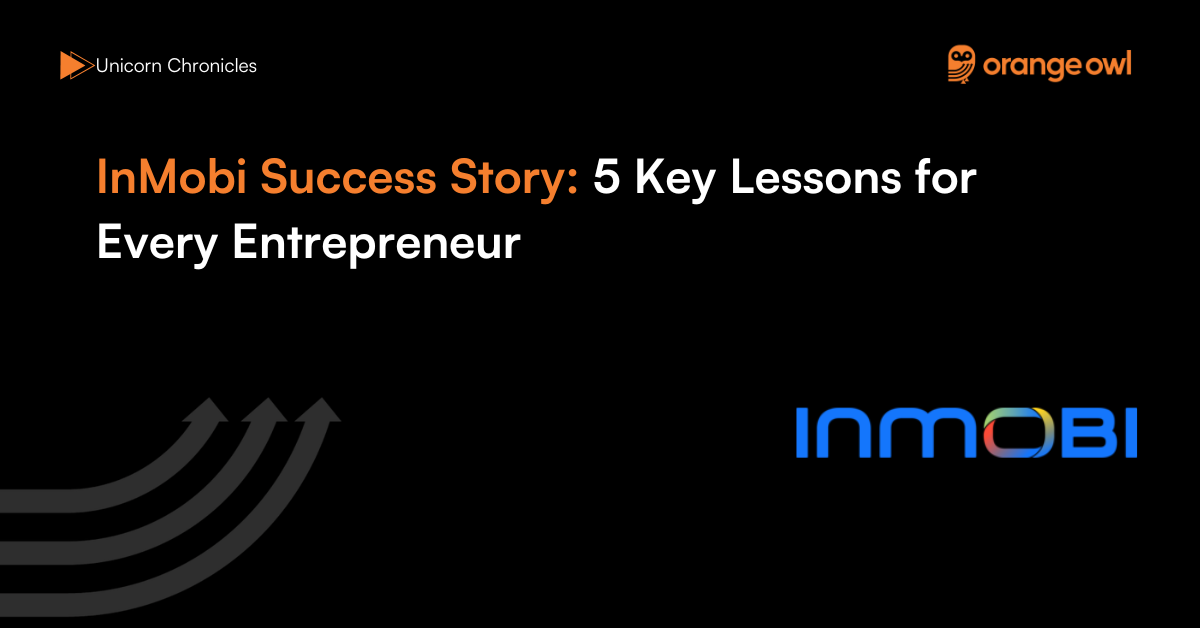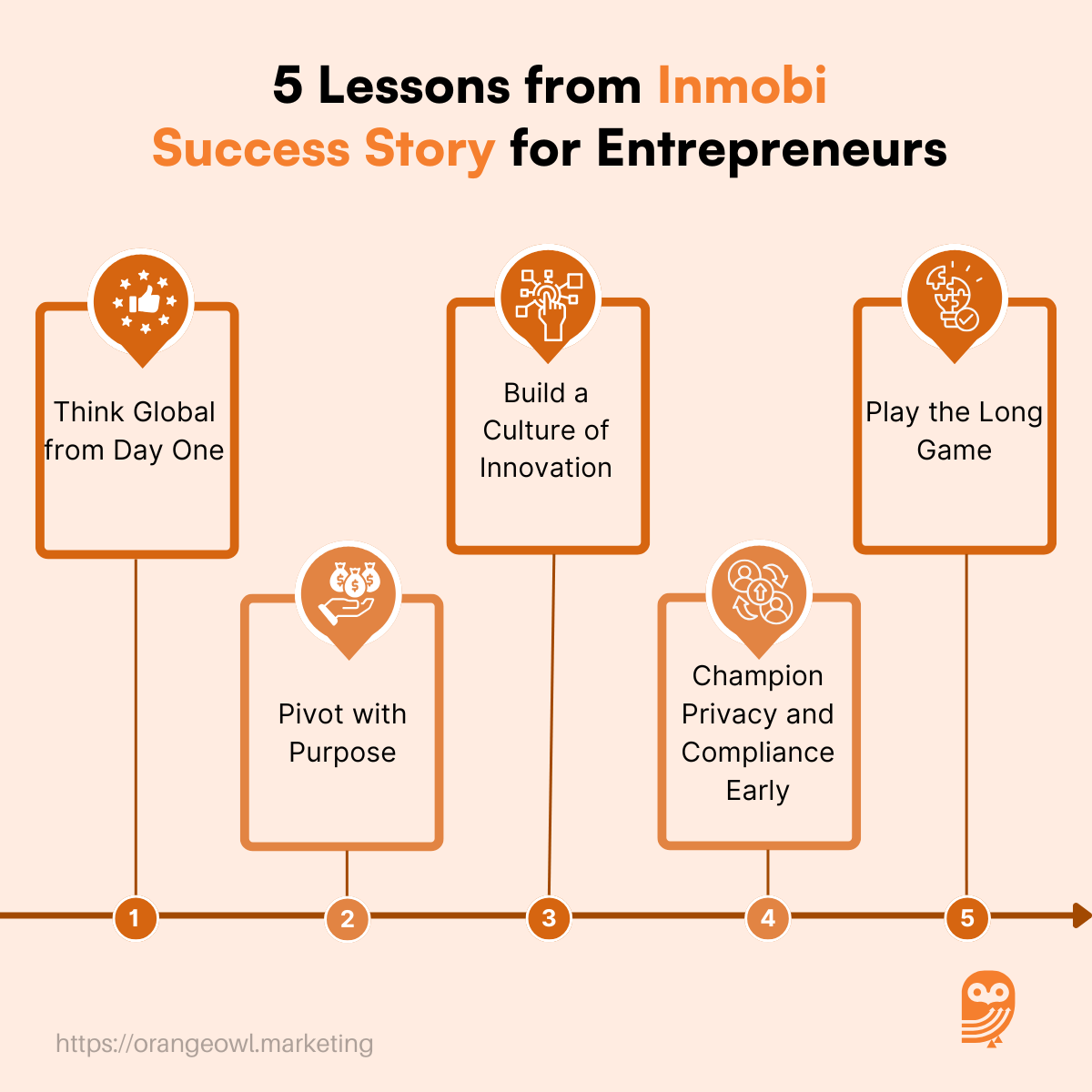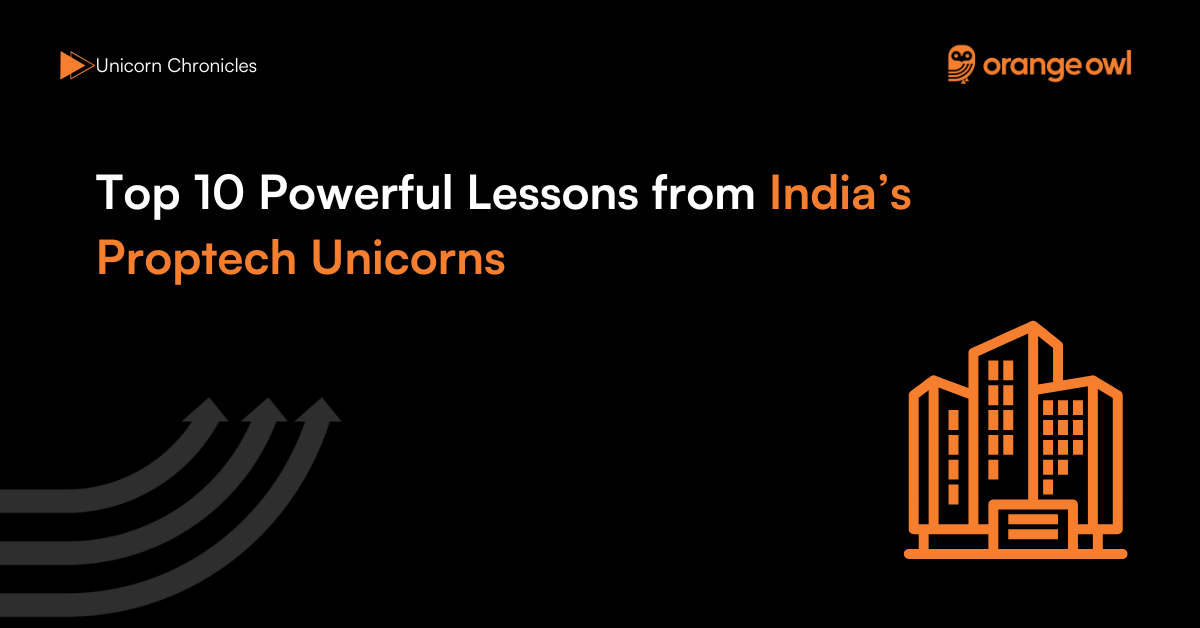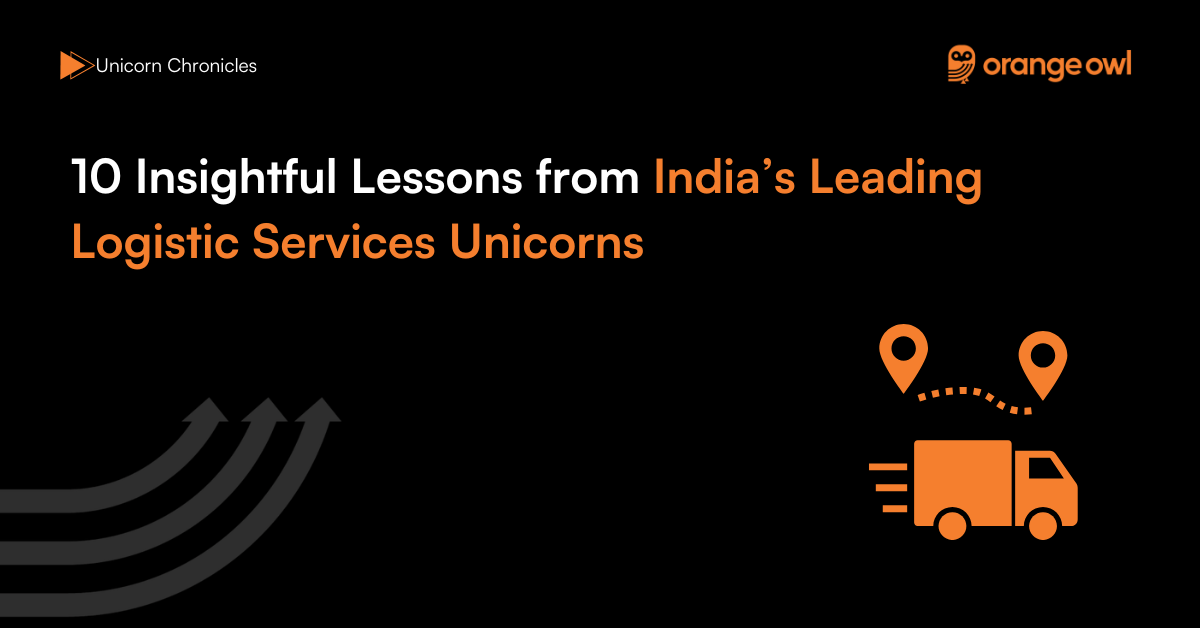InMobi Success Story: 5 Key Lessons for Every Entrepreneur
Vivek Goel
June 7, 2025

Table of Contents
Introduction
In the fast-evolving digital advertising landscape, few Indian startups have showcased the pioneering spirit and technological innovation of InMobi. Founded in 2007 by Naveen Tewari, Abhay Singhal, and Amit Gupta, In the fiscal year 2022-23 (FY23), InMobi reported robust growth driven by its focus on AI-powered advertising products and programmatic marketing solutions, reinforcing its position as a market leader.
Co-founder Naveen Tewari highlights the crucial role of artificial intelligence in their growth:
“We believe AI is not just an enabler but the core driver of marketing innovation, enabling brands to deliver personalised experiences at scale.”
This forward-looking approach, combined with a strong emphasis on data science and consumer-centric innovation, has cemented InMobi’s status as a trailblazer in the global adtech ecosystem — a true testament to the InMobi success story.
Origin Story
The InMobi success story began in the classrooms of Harvard Business School, where Naveen Tewari first conceptualised the idea of building a company that could redefine mobile technology. After graduating and working with McKinsey and later with venture capitalist Kleiner Perkins, Tewari returned to India in 2007 with a bold ambition: to build a globally competitive mobile-first platform from the ground up.
He joined forces with Abhay Singhal, Amit Gupta, and Mohit Saxena, close friends and engineers from IIT Kanpur, to launch mKhoj, a mobile-based search engine catering to emerging markets. However, the team quickly realised that the real opportunity lay in the mobile advertising space, not search.
In 2009, they pivoted from mKhoj to InMobi, focusing on mobile ad solutions that leveraged data intelligence and targeted marketing. This decision to pivot wasn’t just tactical—it reflected a deep understanding of where mobile consumption was heading, especially in markets like India, Southeast Asia, and Africa.
“Our goal was never just to build a company,” Tewari noted in a later interview. “It was to create something that could reshape mobile advertising globally.”
The founding team’s unique combination of technical depth, entrepreneurial grit, and global ambition formed the bedrock of InMobi’s evolution. Their early willingness to adapt, backed by a sharp focus on mobile-first innovation, positioned InMobi as the first Indian unicorn in the adtech space, blazing a trail for other startups in the digital ecosystem.
Business Space and Early Challenges
When InMobi entered the digital arena in the late 2000s, the mobile advertising landscape—especially in India and other emerging markets—was still in its infancy. Desktop advertising dominated, smartphones were a luxury, and brands remained sceptical about the effectiveness of mobile platforms. For a startup aiming to create a mobile-first advertising network, the odds were steep.
The company’s initial product, mKhoj, launched in 2007, was a mobile search platform targeting feature phones in markets like India and Indonesia. However, they soon realised that search alone wasn’t solving advertisers’ core need: reaching users at scale on mobile. In 2009, they made a bold pivot into mobile adtech, rebranding as InMobi. This move placed them in a complex global space dominated by tech giants like Google and Facebook.
Convincing advertisers and app developers to bet on a relatively unknown Indian startup was an uphill task. The market lacked both mobile-savvy marketers and ad infrastructure. Monetisation models were underdeveloped, mobile bandwidth was patchy, and user data was hard to harness effectively. Yet, InMobi doubled down on building proprietary technology and investing in data science, enabling them to deliver personalised, programmatic ad experiences before much of the world caught on.
“There was no playbook,” said co-founder Abhay Singhal. “We had to build everything from scratch—from the ad engine to client education.”
Compliance was another hurdle. Operating in multiple countries with varied privacy regulations and advertising norms required constant adaptation. The company made strategic hires across regions and invested in local insights to ensure relevance and legality.
Despite these challenges, InMobi’s relentless focus on innovation, localisation, and scale helped them earn the trust of global advertisers. By the early 2010s, they were serving ads to millions of devices worldwide, proving that an Indian startup could lead on the global adtech stage.
Growth Strategies
InMobi’s rise from a startup experiment to a global adtech powerhouse was driven by a combination of strategic pivots, global expansion, and deep technological innovation. One of their most defining growth decisions was the shift from mKhoj’s mobile search to a full-stack mobile advertising platform in 2009. This pivot positioned InMobi ahead of the curve, especially in emerging markets where mobile was leapfrogging desktop.
To accelerate growth, InMobi adopted a “mobile-first, global-always” strategy. They expanded rapidly into Southeast Asia, the Middle East, Africa, and eventually the U.S. and Europe, capturing opportunities in mobile-centric economies that were often overlooked by Western competitors. This first-mover advantage in mobile advertising helped them acquire large-scale clients and developers early on.
Technology and data intelligence became central to their growth engine. InMobi built a proprietary advertising cloud, powered by AI and machine learning, to offer real-time ad targeting, programmatic bidding, and personalised creatives at scale. This enabled them to deliver superior ROI for advertisers and better user experience for app developers—key factors in global adoption.
Strategic acquisitions also played a role. In 2015, InMobi launched Miip, a discovery platform to move beyond banner ads and into content commerce and native advertising. Later, in 2019, they acquired Pinsight Media from Sprint, deepening their U.S. presence and telco partnerships. Their enterprise platform, InMobi Marketing Cloud, became a holistic suite offering ad tech, data insights, and user engagement tools under one roof.
Founder Naveen Tewari emphasised innovation as a non-negotiable:
“We didn’t want to copy a Western model. We wanted to invent the future of advertising from India.”
By continuously reinventing their offerings and staying ahead of data privacy and personalisation trends, InMobi carved out a niche as the only Indian unicorn competing globally in the mobile advertising space. Their sustained growth, with revenues crossing $400 million in recent years, is a testament to their visionary leadership and tech-first DNA.
Marketing Strategies
InMobi’s marketing strategy has been uniquely tailored to position itself not just as an adtech solution provider, but as a global thought leader in mobile advertising. Unlike B2C startups, InMobi operates in a highly competitive B2B environment, where brand credibility, product education, and partnership-driven visibility are key to sustained growth.
One of InMobi’s most strategic moves was to market itself as a technology innovator from the Global South. Through consistent participation in major global events like Mobile World Congress, Cannes Lions, and Advertising Week, the company built strong visibility in international markets. These platforms enabled InMobi to demonstrate product capability and showcase thought leadership alongside global players like Google, Meta, and Amazon Ads.
Content-led marketing has also been central to their strategy. InMobi invests in whitepapers, research reports, and case studies that showcase performance metrics and innovative ad solutions across industries. Their blog, webinars, and podcasts have become go-to resources for marketing professionals seeking insights on mobile ad trends, data privacy, app monetisation, and AI-driven personalisation.
Strategic partnerships and co-marketing initiatives have further amplified their brand. InMobi has collaborated with giants like Microsoft, Samsung, and Telcos globally to roll out ad platforms and user engagement tools. These alliances not only strengthened the product but also extended InMobi’s marketing reach across enterprise clients and app developers.
Their emphasis on data privacy and consent-based personalisation—especially through their CMP (Consent Management Platform)—has also become a key messaging pillar, particularly in post-GDPR and CCPA markets. This allowed InMobi to differentiate itself as a responsible, future-ready platform in an era where trust and compliance matter deeply.
“Our goal has always been to make advertising less interruptive and more intuitive,” says Naveen Tewari, underscoring the company’s user-first marketing ethos.
In essence, InMobi’s marketing excellence lies in educating the market, building trust, and elevating the India-born brand onto a global innovation pedestal, making it one of the most respected names in the mobile advertising industry.
5 Fundamental Lessons for Every Entrepreneur
1. Think Global from Day One
InMobi didn’t limit its ambitions to the Indian market. From its early days as an SMS-based search platform, the company pivoted and expanded rapidly into global territories, eventually competing with giants like Google and Meta in the mobile advertising space.
Founder Naveen Tewari believed in building for the world and not just for India, a mindset that pushed the team to adopt global standards in technology, user experience, and data compliance.
For entrepreneurs, the InMobi journey shows the power of a global vision, especially when your product has the potential to solve universal problems.
2. Pivot with Purpose
InMobi’s transformation from mKhoj (a mobile-based search engine) to a mobile advertising powerhouse is a textbook example of purposeful pivoting. When early traction for mKhoj wasn’t promising, the team analysed user data, identified the real opportunity in mobile advertising, and made a bold shift. This agility turned a struggling startup into India’s first unicorn.
The lesson? Don’t cling to your original idea if the market is pointing elsewhere. A timely pivot—driven by data, not desperation—can define your startup’s trajectory.
3. Build a Culture of Innovation
InMobi’s internal culture has always prioritised experimentation and innovation. Whether launching Glance (a lock-screen content platform) or acquiring tech startups like Sprout, the company has constantly sought out new ways to engage users and add value to partners.
Their in-house innovation lab and support for intrapreneurship have allowed them to stay ahead of market trends and retain top talent.
For founders, fostering a culture that encourages bold ideas and rapid prototyping can unlock new business verticals and long-term resilience.
4. Champion Privacy and Compliance Early
Operating in the data-intensive adtech world, InMobi took early steps to become GDPR- and CCPA-compliant, a move that earned them global trust. Their investment in a Consent Management Platform (CMP) and transparent data usage policies helped them enter regulated markets like Europe and North America with confidence.
In a world increasingly focused on digital rights, InMobi teaches that privacy is not a constraint—it’s a competitive advantage. Startups handling user data must integrate compliance from day one, not as an afterthought.
5. Play the Long Game
InMobi’s journey to unicorn status wasn’t overnight. It involved patient capital, long product cycles, and a deep commitment to solving a real-world problem at scale. Even when funding dried up in the early 2010s and competitors rose aggressively, InMobi stayed focused on building a sustainable business.
As Tewari often says, “Real entrepreneurship is not about valuation; it’s about value creation.” This long-term mindset—balancing ambition with patience—is a powerful lesson for founders navigating the high-pressure world of startups.
Conclusion
InMobi’s journey from a small mobile search startup to a global adtech unicorn is a remarkable case study in vision, resilience, and fearless reinvention. What began as mKhoj, a scrappy experiment in SMS-based services, transformed into a billion-dollar enterprise that competes with the biggest names in mobile advertising and content discovery.
At its core, InMobi’s success lies in its relentless drive to innovate, its willingness to pivot when needed, and its deep commitment to building for the future—be it through data privacy, AI-driven advertising, or ventures like Glance and TruFactor. The company didn’t just scale; it evolved—geographically, technologically, and culturally.
More importantly, Naveen Tewari and his team demonstrated that Indian startups can lead on the global stage—not by copying Silicon Valley, but by solving problems with originality, ambition, and staying power. InMobi didn’t chase hype; it chased impact.
For entrepreneurs, InMobi’s story is a powerful blueprint: build with courage, adapt with purpose, and never underestimate the value of long-term thinking. In an ecosystem obsessed with quick wins and unicorn tags, InMobi reminds us that the companies that truly endure are those that combine world-class innovation with grounded execution. It’s not just a success story—it’s a defining chapter in India’s digital revolution.



